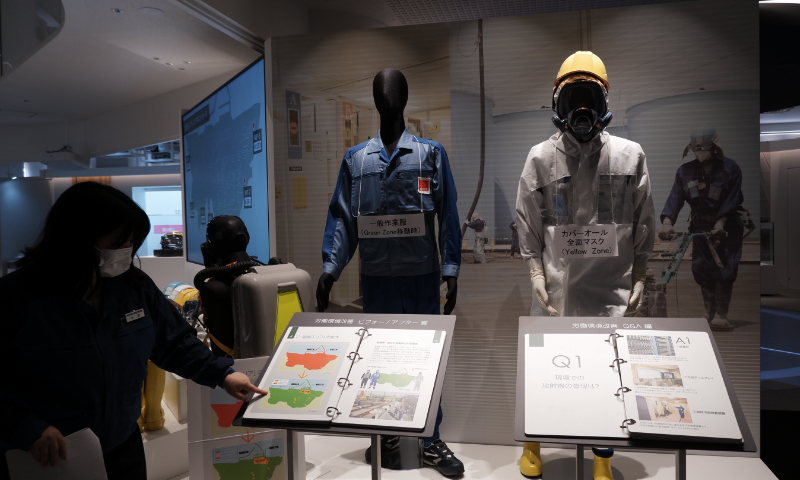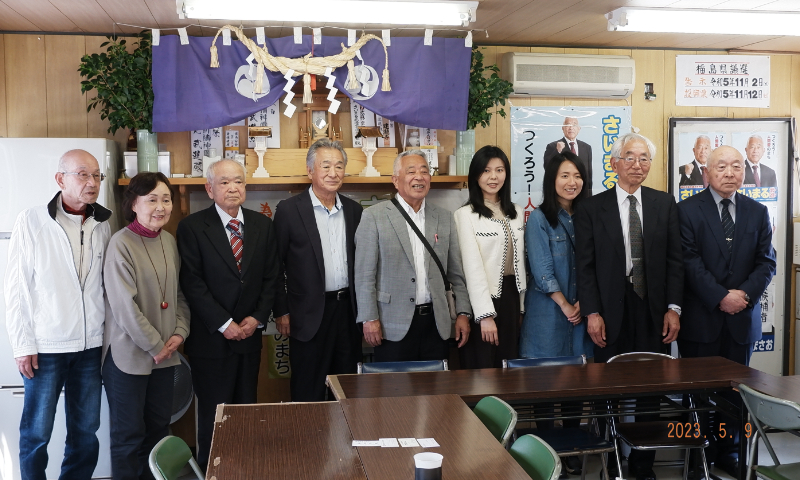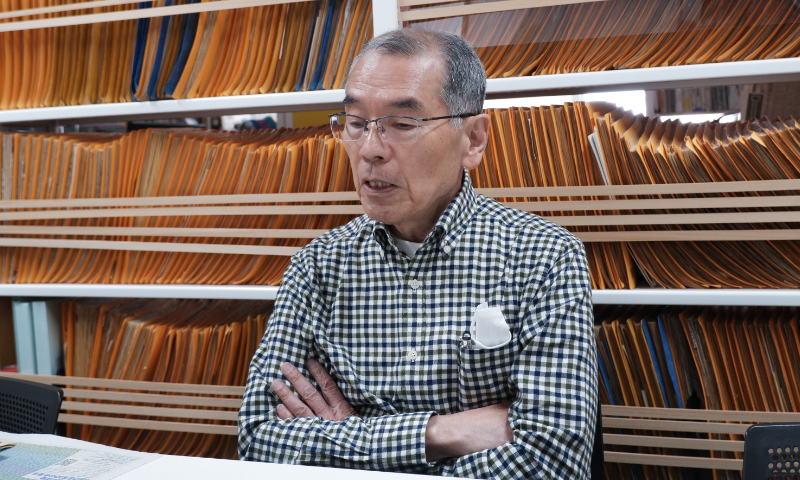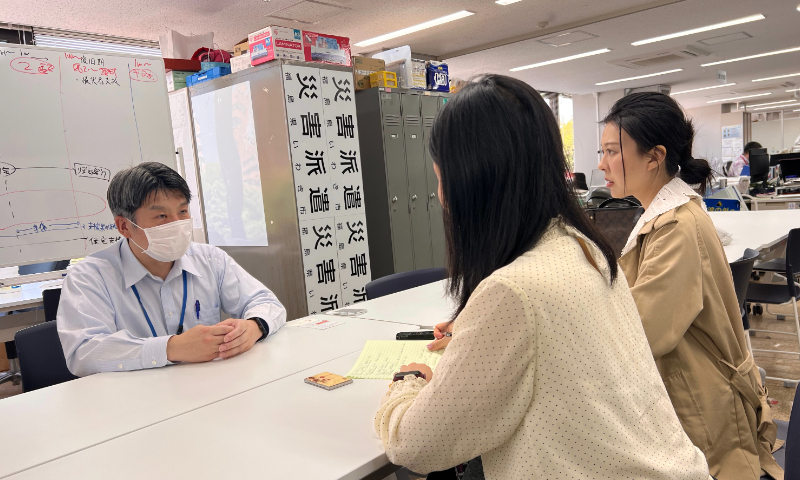
A staff member introduces the radioactivity protective suits at the TEPCO Decommissioning Archive Center in Japan on May 10, 2023. Photo: Xu Keyue/GT
Editor's Note:The Group of Seven (G7) summit, under Japan's rotating presidency, is scheduled to be held later this week in Hiroshima, which suffered a lot from the atomic bombings in World War II. But the Japanese government has seemingly failed to learn from history and insists on dumping nuclear-contaminated wastewater from the Fukushima Daiichi Nuclear Power Plant into the sea.
As the scheduled plan to dump the wastewater approaches, Global Times reporters went to Fukushima. In the third and final installment of this field investigation, the Global Times speaks to Japanese people from various fields such as prefectural lawmakers, environmental organizations and nuclear experts. Although all of them believe the "dumping plan is not feasible," they feel powerless as the Japanese government doesn't hear their voices.

Bushin Saimaru (center), a lawmaker in Fukushima Prefecture poses for a photo with his friends and Global Times reporters after receiving an interview on May 9, 2023.
Feeling of powerlessnessAfter the Fukushima Daiichi Nuclear Power Plant accident in March 2011, the Japanese government and the Tokyo Electric Power Company (TEPCO) drew up a road map for the decommissioning of TEPCO's Fukushima Daiichi Nuclear Power Station Units 1-4 by 2051, which involves the disposal of the nuclear-contaminated wastewater and retrieval of nuclear fuel debris.
In 2015, the Japanese government, TEPCO and Japanese fisheries associations
signed an agreement, stating nothing would be done "about the nuclear-contaminated water from Fukushima without the understanding and consent of the relevant people." However, in April 2021, the Japanese government went back on its promise and announced the wastewater dumping decision, sparking strong dissatisfaction in Fukushima and the wider public.
For an in-depth look at the local situation, Global Times reporters contacted Bushin Saimaru, a lawmaker from Fukushima Prefecture. Saimaru, 79, has been elected seven times as a lawmaker in Fukushima and is seeking an eighth term in the November elections. The interview took place at his office, where he had been waiting with several friends when the Global Times reporters arrived.
"Not one of the 1.8 million people in Fukushima Prefecture approves of the release of the wastewater containing radioactive materials into the sea," Saimaru said.
It is not clear how the marine and ecological environment will be affected by the radioactive wastewater discharge, and the consequences of radioactive seafood entering the human body are also unpredictable. "How can we rush to dump the wastewater when there are still many questions?" Saimaru asked.
"Fishermen may get some compensation, but isn't life more important?" The lawmaker asked. There are alternatives to deal with the nuclear-contaminated wastewater, but the Japanese government and TEPCO are acting like they have no choice but to "discharge the radioactive wastewater" and have told citizens to "be more understanding."
According to Saimaru, the issue of opposing the radioactive wastewater dumping plan has been discussed several times in the Fukushima prefectural assembly. The prefectural assembly believes that the Japanese government and TEPCO should take responsibility and protect the safety of the people in Fukushima, and must carefully handle the nuclear-contaminated wastewater.
Saimaru revealed that the prefectural assembly has repeatedly proposed its deep concern over the issue to the National Diet of Japan, but received nothing more than "OK" and "I understand" - no substantive progress has ever been made.
Saimaru told the Global Times that he was very concerned that once the nuclear-contaminated wastewater is dumped into the sea, everything would return to zero again despite 12 years of efforts to revitalize the prefecture.
Also, as the Japanese government did not seek the understanding and consent of the people before deciding on the wastewater dumping plan, Fukushima could be plunged into unimaginable chaos if the discharge starts, Saimaru said. What worries him more is that instead of confronting the problem, the government and TEPCO have been trying to skillfully steer public opinion and using various PR stunts in an attempt to get the public on their side.
"I have never felt so powerless before! The country should have been a good listener to the public. Why can't it hear the opposition of the people in Fukushima Prefecture?" Saimaru asked.
"As Fukushima lawmakers, we are the bridge between the prefecture and the country, but now we are in a dilemma," Saimaru said. "We want the government to come up with policies that will reassure the public, but the government is just making gestures and ignoring public opinion."
Saimaru said that the Japanese government has not only failed to hear the voice of its own people, but has also turned a blind eye to the wave of international opposition. Under this atmosphere, with pressure and tricky rhetoric from the Japanese government, many Japanese people became silent, so people's speech is blocked from reaching the policymakers. "It is unbelievable!" Saimaru said.

Hideyuki Ban, a Japanese nuclear expert and co-director of the Citizens' Nuclear Information Center (CNIC) Photo: Xu Keyue/GT
Not listeningAfter the 2011 disaster, the Japanese government and TEPCO planned to complete the decommissioning of the Daiichi nuclear power plant by 2051, but many Japanese experts and scholars believe it would be "almost impossible," said Hideyuki Ban, a Japanese nuclear expert and co-director of the Citizens' Nuclear Information Center (CNIC), in an exclusive interview with the Global Times in Tokyo.
In order to push ahead with the decommissioning project, the Japanese government and TEPCO knowingly made an agreement with Fukushima Prefecture that they would not dispose of radioactive materials inside Fukushima, but would move the work outside the prefecture. The problem is that no other prefectures are willing to take on the "hot potato." As the nuclear-contaminated wastewater accumulates more and more in Fukushima, the Japanese government has decided to dump it, as if this would solve the thorny problem.
In Japan, which boasts of being a "democracy," bureaucrats have long been prone to making decisions on their own, often more to avoid responsibility than to solve problems, Ban said.
The Japanese government's decision to deal with nuclear-contaminated soil from Fukushima was also "haphazard." Soil contaminated by the Fukushima nuclear disaster that has been tested to be "safe" will be transported outside Fukushima Prefecture for "reuse" in flower beds and grass, Japan's Ministry of Environment has said. The Japanese public is concerned about the spread of radioactive materials, and the media outlet Tokyo Shimbun commented that the Japanese government lacks a reasonable explanation for whether the contaminated soil can be reused.
Ban noted that the Japanese government does not completely avoid dialogue with local governments, but prefers talks such as meetings with representatives of fishing associations, rather than individual fishermen. "The Japanese government has never tried to listen to the true voice of the people, which is an inherent vice in Japanese politics," Ban noted.
In the interview with Haruo Ono, a fisherman in the town of Shinchi, Fukushima, Ono mentioned that an official from the Ministry of Economy, Trade and Industry had visited Fukushima, and only had simple communication with the staff members of the fishing association. He later tried to ask for an explanation why the fishermen hadn't been invited to the talks, but with no result.

Kohei Kusano, director of the atomic power response section of the crisis management department in Iwaki, Fukushima Prefecture, Japan, receives an interview with the Global Times on May 11, 2023.
Kohei Kusano, director of the atomic power response section of the crisis management department in Iwaki, Fukushima, told the Global Times that when the government holds relevant meetings, it usually arranges for representatives to attend, and not many stakeholders have the opportunity to attend. The delegates collect opinions from all sides in advance to form "a unified plan," but it is difficult to reflect the various opinions, which may be the reason why the voice of the people cannot be conveyed to the top.
Global Times reporters also went directly to the atomic power response section without an appointment in advance and were received by the official in charge. However, when asked "How do you view the opposition to the nuclear-contaminated wastewater discharge?" and "How do you assist the government in promoting the discharge?" his answer was always "We will deliver the correct message [to the public]."
But when asked, "Do you think 'treated water' is safe?" Kusano, who has been engaged in atomic power-related work for years, finally gave a different answer, saying "it is not convenient to comment." He later added his own opinion, saying that "if certain criteria [of the 'treated water'] are met, it may not matter [even if the water is discharged into the sea]." But he also noted that he could "understand public unease."
Trying a whitewashEven if the Japanese authorities understand public unease, it does not mean they are truly trying to address it. A government official in Okuma town, Futaba, Fukushima, told the Global Times that many people in the town could not understand the decision, and said that the Japanese government had promised to "gain understanding" but without much follow-up effort.
The town government is asking the Japanese government to take its responsibility, to carefully explain and be transparent in response to the public concerns over the nuclear-contaminated wastewater dumping plan, and to offer a reasonable explanation about the so-called safety of the radioactive wastewater, according to the official.
The official added that the decision was made by the Japanese government and the town has no right to interfere, so it is up to Tokyo to defuse public unrest.
A Japanese official who requested anonymity told the Global Times that for the Japanese government, discharging the nuclear-contaminated wastewater is undoubtedly the most convenient and quick solution, and there is indeed no precedent for it in terms of safety.
Since the Fukushima nuclear accident happened, Japan has been working hard to eliminate negative public opinion. It has hired advertising agencies, organized media groups and spent tens of billions of yen on propaganda about the so-called safety of the nuclear-contaminated wastewater.
According to the 2023 budget document published by Japan's Ministry of Economy, Trade, and Industry in August 2022,
the PR expenses alone stand at 2 billion yen (around $16 million). The 2021-budget document also showed that PR expenses were 2 billion yen, over four times those from the previous year.
The money has been used to "strengthen the effective dissemination of information to eliminate reputational damage and concerns that persist in Japan and overseas," read the document.
Surprisingly, Chinese students have also become the target of the Japanese government's PR efforts. During the trip in Fukushima, Global Times reporters learned that Koji Oikawa, a Japanese teacher in Iwaki, recently received 23 Chinese students at the request of the Japanese Reconstruction Agency to talk about the safety of Fukushima food and the results of Fukushima's revitalization program.
Oikawa, 53, has taught Japanese in China for more than 20 years and is well known in the Japanese teaching industry. He moved to Fukushima two years ago and teaches Chinese students online.
He told the Global Times that, in the face of the international criticism and doubts about Japan's plan to dump the nuclear-contaminated wastewater, the Reconstruction Agency tried to invite Chinese students in Tokyo for a field tour to Fukushima, but the Chinese students did not buy it, and no one signed up.
Knowing that Oikawa is a popular Japanese teacher in China, the Reconstruction Agency contacted him and entrusted him to lead the student team in Fukushima. Sure enough, 23 Chinese students came to Fukushima with Oikawa in late March. In an attempt to "whitewash" Chinese students' negative image of Fukushima, the agency took them to see radioactivity tests on Fukushima food and taste local food.
Commenting on the Japanese government's decision to dump nuclear-contaminated wastewater, Oikawa said he was "supportive" because he trusts the Reconstruction Agency. "The Reconstruction Agency said it was treated water, not nuclear-contaminated water," Oikawa said.
But after learning that a number of long-lived radioactive elements, including tritium and Carbon-14, cannot be removed even after the nuclear-contaminated wastewater was treated through ALPS, Oikawa said that the Japanese media did not often report negative content about the discharge, and that he would learn more about it in the future.
In order to make the Japanese public accept the plan calmly, the Japanese government even sent officials from the Ministry of Economy, Trade and Industry, the Ministry of Environment, the Reconstruction Agency and other departments to carry out propaganda work on campuses. Leaflets about the so-called "safety of the ALPS-treated water" have been distributed to students. However, under the strong public backlash to the dumping plan as well as the local criticism against the government for forcing people to recognize the safety of ALPS-treated water, some schools have stopped handing out the leaflets.
"This [the propaganda] is not going to work," said Terumi Kataoka, a member of an environmental NGO and city assembly, adding: "Stop polluting the oceans!"
Taking Fukushima Prefecture as an example, Kataoka revealed that in order to promote the safety of seafood from Fukushima, the Japanese government tried to use the seafood in elementary and secondary school meals, which displeased locals a great deal. "That is food going into children's mouths!" Kataoka said.
She and her friends called dozens of local education committees in the prefecture and received replies from seven educational institutions. They found that almost all the local schools had rejected the Japanese government's proposal.
"Politics and education should be separate. What the Japanese government has done is not only to conflate the two, but also to disregard the lives and safety of children," said Kataoka.
"The people of Fukushima bear the scars of disasters and would not allow man-made harm to happen." But she noted that in some schools outside Fukushima, the presence of senior government officials is seen as an "honor" and children are easily influenced by the "big shots" that they can't meet easily.
"It's not the children's problem, it's an education problem," Kataoka stated.
"If the Japanese government really wants to reassure people, they have to respond seriously to public concerns," Kataoka stressed, noting that trying to force whitewashing makes it harder for people to accept the nuclear-contaminated wastewater dumping plan.
Public keep protestingAs an ordinary Fukushima resident, Kataoka shares the same worries as Fukushima lawmaker Saimaru. "We have organized activities against the plan to dump contaminated water many times, by holding speeches, demonstrations and holding placards while protesting. Can't the government hear us? Why can the country turn a blind eye to the fear, insecurity and anger of its people? What more could we do?"
To Kataoka's relief, every time they organized a related campaign against the nuclear-contaminated water dumping plan, passers-by always stop to watch. People took videos and photos and posted them on social media, showing their support.
"That made me feel like we're not an islet. Even if the government doesn't hear our voice, people agree with us, so our persistence is meaningful," said Kataoka. "It may be the power of the grassroots."
This reminded Global Times reporters of an irony. When Japanese Prime Minister Fumio Kishida boasted he is "good at listening" during the leadership election for the Japanese ruling Liberal Democratic Party in September 2021, he held a blue notebook with a tattered cover, saying "I have written 30 such notebooks over the past 10 years after listening to the public."
Walking through Tokyo after a visit to Fukushima, a new political campaign poster of Kishida came into view. "With local voices, to create a new Japan," it read. But this doesn't seem to have anything to do with the current situation in Fukushima.







